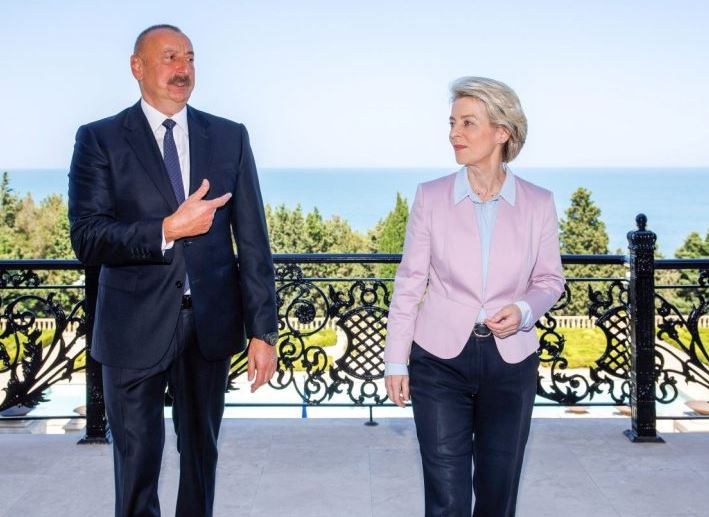The Armenian Mirror-Spectator
By Alexander E. Gale
During a press conference in July, the European Commission’s president, Ursula von der Leyen spoke of the need for the EU to “diversify away from Russia and turn towards more reliable, trustworthy partners.” She cited “Russia’s brutal invasion of Ukraine” as a reason to move away from Russian gas. She was joined by Azerbaijani president, Ilham Aliyev, to announce an agreement for Azerbaijan to double its delivery of gas to the EU. The irony that Aliyev’s authoritarian regime has been implicated in war crimes and corruption was apparently lost on von der Leyen.
The past year has posed several dilemmas to European energy security. The EU is highly dependent on gas from Russia. Last year, 39.7 percent of the EU’s imported gas came from Russia. However, Putin’s invasion of Ukraine has threatened the reliability of this source of energy.
Read also
EU members are concerned that Moscow will cut off gas supplies in retaliation for widespread sanctions levied against the Russian economy and Western military support for Ukraine. Indeed, this summer, Russia cut gas from 170 cubic meters a day to 20, supplied via the Nord Stream 1 pipeline. Over the past year, Moscow has cut its total export of gas to Europe by approximately 88 percent.
In late September, Explosions disrupted the operation of the Nord Stream 1 and Nord Stream 2 pipeline and further heightened fears that the flow of natural gas from Russia would not reach Europe. The EU has not blamed Russia directly but suspects sabotage.
Gas is central to the EU’s energy security. Households in EU member states use gas as their primary source of energy at about 32.1 percent. Gas also makes up 21.5 percent of the EU’s primary energy consumption. Most gas is imported. Only 20 percent of the EU’s demand for gas is met by domestic production, which itself has halved over the past 10 years.
The Azerbaijan Gas Deal
Securing alternative energy suppliers to Moscow is a strategic imperative for Brussels. Azerbaijan, with its vast reserves of natural gas in the Caspian Sea, is — on paper — an ideal partner.
The EU-Azerbaijan gas deal is set to increase the delivery of natural gas to Europe from 8 billion cubic meters per annum to 20 billion. By 2023, exports are expected to reach 12 billion cubic meters. The bloc is also planning to invest €60 million of EU funds in Azerbaijan until 2024 with the prospect for further investment via the Economic and Investment Plan, which could facilitate €2 billion in investment.
However, the EU’s decision to make a deal with Azerbaijan is profoundly hypocritical. In March this year, the European Parliament voted in favor of a resolution condemning Azerbaijan’s government of deliberately “erasing and denying” Armenian cultural heritage in Nagorno-Karabakh. According to the resolution: “erasure of the Armenian cultural heritage is part of a wider pattern of a systematic, state-level policy of Armenophobia, historical revisionism and hatred towards Armenians promoted by the Azerbaijani authorities, including dehumanization, the glorification of violence and territorial claims against the Republic of Armenia.”
The EU’s decision to make an energy deal with the very government it had accused merely months earlier of human rights violations is a damning indicator that its proposed morals are only skin deep. This double standard is especially troubling at a time when the bloc is projecting itself as a paragon of liberalism and democracy in juxtaposition to Russian aggression and authoritarianism. The EU has rightly decried Putin’s invasion of Ukraine and condemned humanitarian abuses but these sentiments fall flat when Brussels will only act on its convictions when they are politically expedient.
Russia has routinely accused the West of hypocrisy to deflect attention from its own nefarious conduct. Every failure by the EU to act according to the moral and ethical principles it has set for itself acts as ammunition Putin can use to win the information war.
Since signing the gas deal, the EU’s response to humanitarian abuses by Azerbaijan has been tepid, despite the continued alarm of NGOs. Last month, Human Rights Watch verified the authenticity of a video showing the extrajudicial killing of seven Armenian prisoners of war by Azerbaijani soldiers. The torture, rape, mutilation, and murder of a woman in the Armenian armed forces by Azerbaijani troops also surfaced after a video was posted online. The EU has stressed the need for a probe into alleged war crimes. However, an EU spokesperson also admitted that the bloc has no investigative power in the Caucasus and Azerbaijan was being encouraged to self-investigate.
Peace between Azerbaijan and Armenia remains elusive which means Brussels should be careful to avoid inadvertently funding war crimes. However, when asked if the EU would implement measures to ensure EU money is not spent on the conflict or human rights violations, an EU official commented that no such mechanisms exist
Short-sighted Strategy
In international relations ethical sentiments rarely triumph over the cold necessities of realpolitik. However, the Azerbaijan gas deal is also a bad long-term strategic move.
Authoritarian regimes have a tendency to wield energy exports as a tool for foreign policy leverage. For example, in the aftermath of the Yom Kippur War, several Arab states instigated an oil embargo to dissuade international support for Israel, causing the 1973 oil crisis. Today Putin is leveraging Russia’s position as an energy supplier to discourage foreign support for Ukraine. In the future, Aliyev may decide to leverage Azerbaijan’s energy supply to similar ends. In fact, Azerbaijan is alleged to have deliberately cut off gas supplies to areas of Nagorno-Karabakh in March this year. In choosing to import gas from Azerbaijan, the EU has opted to kick its energy dependency-problem down the road, instead of seeking a comprehensive long-term solution.
In its dealings with the EU, Aliyev’s regime has already demonstrated itself to be a thoroughly unscrupulous partner. In 2018, 13 members of the Parliamentary Assembly of the Council of Europe (PACE) were expelled from the organisation for accepting bribes and gifts from Azerbaijan. The Organised Crime and Corruption Reporting Project found that between 2012 and 2014, Azerbaijan had laundered $2.9 billion to pay off EU politicians. Bribes were used to assuage concerns regarding Azerbaijan’s human rights record. For example, a senior EU official in the PACE was paid a bribe of €500,000 to disrupt a 2013 report on political prisoners in Azerbaijan.
There is also the issue of whether turning to Azeri gas would satisfy the basic requirement of being an actual alternative to importing from Russia. In February this year, Lukoil increased its share in Azerbaijan’s Shah-Deniz gas project to the tune of approximately $1.45 billion, upping its stake from 10 percent to 19.99 percent. Lukoil is Russia’s second largest company, behind energy giant, Gazprom. Lukoil’s share in Azerbaijan’s primary source of natural gas is now second only to BP. The EU would therefore be unable to completely bypass Russian involvement in gas imports from Azerbaijan.
Alternatives to Azeri Gas
The gas deal is only part of a broader jigsaw puzzle that will need to be assembled for the EU to wean itself off Russian energy. Although the jump to 20 billion cubic meters of gas per year is significant, this delivery from Azerbaijan would not be anywhere near enough to entirely replace Russia. Russian gas exports to individual EU members far exceed the projected amount that Azerbaijan will export to the bloc in its entirety. Last year, Russia exported 56.2 billion cubic meters to Germany and 29.2 billion to Italy, alone.
Since Azerbaijani gas can only act as a partial replacement for Russian energy alongside other substitutes, this raises the question: can Azeri gas itself not be substituted for a better option?
The EU is making an effort to increase cooperation with gas exporters like Norway, the US, Japan, South Korea, Turkey, Qatar, Algeria, and Egypt. Some of these suppliers are sensible long-term alternatives to both Russia and Azerbaijan, whereas some pose similar concerns.
The EU should also consider alternatives to gas, altogether. Renewable energies like wind, solar, and hydropower, together with nuclear power present the best-long term solutions. They have the added benefit of being better for the environment. The main drawback is implementation time. In the short to medium-term, the EU would likely have to continue seeking alternative gas suppliers and potentially increase coal usage, which has fallen out of favour due to environmental concerns.
A perfect energy solution does not exist. The EU will have to make compromises, be they security-based, moral, environmental, or economic. Nevertheless, if the definition of insanity is doing the same thing over and over and expecting different results; then the EU-Azerbaijan gas deal is insane. The EU energy crisis is a lesson on the perils of energy dependency on authoritarian regimes. Brussels should not fail to heed that lesson.
(This commentary originally ran in Moderndiplomacy.eu on November 5.)



























































